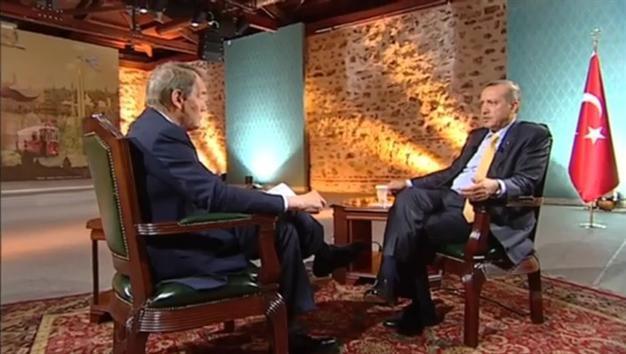Turkish PM Erdoğan ‘hopes’ US will send back Gülen, saying legal process will start
Tolga Tanış WASHINGTON / Hürriyet

Pm Erdoğan gave an interview Charlie Rose on U.S. broadcaster PBS, aired on April 28.
Prime Minister Recep Tayyip Erdoğan has continued his salvoes against the Pennsylvania-based Islamic scholar Fethullah Gülen and Turkey’s top judge Haşim Kılıç, in his first interview with foreign media since the March 30 local elections.Speaking to Charlie Rose on U.S. broadcaster PBS on April 28, Erdoğan said publicly for the first time that he “hopes” the U.S. will send Gülen back to Turkey.
A legal process will begin for extradition of Gülen from the U.S., Erdoğan also said on April 29.
“After I became prime minister, I didn’t have any meetings with [Gülen] other than a few phone conversations. I used to have meetings with him when I was the mayor of Istanbul. During my tenure as prime minister, we had good relations with this group during the first two terms,” he said in the interview.
“But the real problem began after 2011, after the referendum for the constitutional amendments. Then, there was an effort to take away some power. This effort involved the police, security forces, the judiciary and my observation now, in hindsight, is that the efforts then were to consolidate this power in the security forces and the judiciary,” Erdoğan added.
When asked whether he “just woke up one day and found out that Gülenists had infiltrated the government so much so that they are a parallel government,” Erdoğan responded: “We were aware they were trying to infiltrate various organizations, but we were not aware of their ultimate bad intentions. And we felt, we realized this after a while and started to take measures.”
Erdoğan said “the first step” the Gülenists took was against the undersecretary of the National Intelligence Agency (MİT) regarding meetings with representatives of the outlawed Kurdistan Workers’ Party (PKK) that were ongoing in Oslo. The Dec. 17 and Dec. 26 graft investigations of 2013 marked the point at which these Gülen-led efforts turned into “almost a coup, a civilian coup,” he said.
“If I remained silent, things would have gone a different way,” he added, claiming that the Gülenists also tapped his Prime Ministry office. When answering journalists' questions in Ankara on April 29, Erdoğan clarified that "the legal procedure will start" in Turkey to let the U.S. send Gülen back.
The prime minister stressed that he hopes the U.S. will send Gülen back to Turkey, as a “model partner,” as Ankara would do the same if a person who risked the security of the U.S. resided in Turkey. “At least they should deport him,” he said, despite there being neither a warrant nor a court verdict in place against Gülen.
Erdoğan also rejected the corruption allegations by referring to the good performance of the Turkish economy.
Turkey’s top judge was another target in the PBS interview. Referring to Constitutional Court Head Haşim Kılıç’s April 25 speech, in which Kılıç slammed the government over its interventions into the judiciary, Erdoğan said he “sadly listened to the speech.” He added that Kılıç would “remain under the burden of his speech all of his life.”
‘Obscenities and virtual sex strictly banned’
After criticizing the Constitutional Court ruling that unblocked Twitter, Erdoğan also stressed that the San Francisco-based social media company should respect the court’s rulings, open an office and pay taxes in Turkey. He referred to the local court verdicts issued after his own complaints for the suspension of Twitter accounts that “insulted” him. “There are also obscenities and virtual sex, which are strictly banned,” Erdoğan said.
















